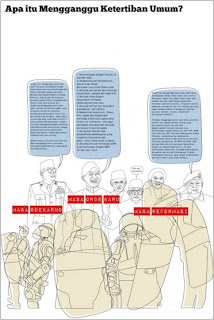

David Kaye:: The Shifting Landscape of International Justice
UCLA Law professor David Kaye began the first session by exploring the issue of how the international community can support national mechanisms for justice and accountability. Kaye’s presentation took a broad perspective on issues of post-conflict accountability, thus situating Indonesia and East Timor in a larger context.
Kaye first provided an overview of the elements of post-conflict justice, ranging from national responses to promote criminal accountability to international interventions, hybrid tribunals, and the roles of political and regional bodies. Regarding national responses, Kaye noted that immediately moving from conflict to criminal accountability is often too difficult, which has spurred the creation of alternative national mechanisms such as the TRC model; vetting of bureaucrats for past participation in international crimes; commissions of inquiry; documentation efforts; and reparations processes. Looking to the creation of the TRC in South Africa, which is often invoked as an example of a successful post-conflict national response, Kaye observed that it was in some respects an outlier. What is more typical in a post-conflict situation is political and legal fracturing, rather than a community coming together to rebuild. This fracturing may result in resistance to any forms of accountability from groups that fear losing power, as well as case-by-case prosecution that fails to provide a comprehensive view of what happened in the past.
Furthermore, Kaye noted that inadequate infrastructure, both legal and institutional, may also create barriers to accountability. Taking the DRC as an example, Kaye noted that institutional problems such as insecure prisons and an inadequate number of courtrooms limit national responses. Similarly, a legal infrastructure that does not include sufficient laws for prosecuting crimes against humanity, in conjunction with the problem of inadequately trained defense counsel, results in a national justice system lacking credibility.
In conclusion, Kaye noted that despite all of the challenges, there is a widespread donor community advocating for international justice and rule of law. Still, this community faces its own challenges, including a lack of coordination among donor efforts, which may result in duplication of donor efforts in certain areas and the neglect of other areas. Lack of long-term commitment and a failure to link the post-conflict transitional justice world to issues of long-term rule of law are also shortcomings of the donor community’s historical response, which must be addressed to facilitate genuine accountability.
John Roosa:: Towards a History of Indonesia's Metapolitics: The Law on Censorship
How do we conceptualize the rule of law versus rule by law? Constitutions in the West limit political authority and enhance the rights of citizens whereas in middle east the law is often a way to limit rights and condense power in an authoritarian regime. Within this backdrop, Professor John Roosa discussed a personal and national success story about his book on Indonesia’s recent violent history that was banned in December 2009 soon after it was published. In a constitutional court challenge, over one dissent, the court found the Attorney General’s Office banning of his book unconstitutional. Notably, and specifically, the attorney general argued the book “disturbed public order” pursuant to a 1963 law and that this decision was made by an unbiased objective committee. Further, the Deputy Attorney General presented a state action argument basically on the principal that if the state acts then the action is valid. More interestingly, this same official actually listed the six reasons why the committee banned the book, for the first time, without having any official account refuting the narrative outlined in Professor Roosa’s historical account of the recent violence in Indonesia. Ultimately, the banning of the book conflicted with the code of criminal procedure and, thus, declared unconstitutional. The case presented by the Deputy Attorney General begs the question where is the official account and will the state strive to develop an accurate historical account?
Finally, and despite the success of his constitutional challenge that protected free speech, Professor Roosa conveyed mixed feelings as to the new reliance of rule of law in Indonesia. While not delving deep into this subject he cautioned that for a long time Indonesians sought to move away from the rule of law which largely left potentially dangerous Islamic Law as the only law. However, as evidenced by his landmark constitutional victory protecting free speech, Professor Roosa sees this step towards rule of law as a positive step.

No comments:
Post a Comment